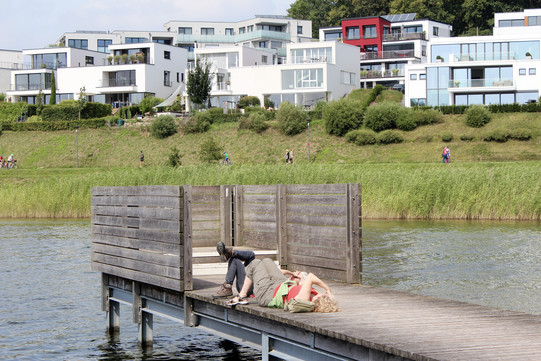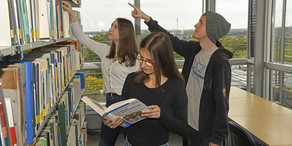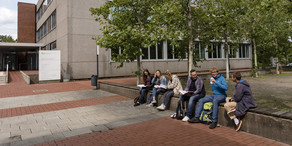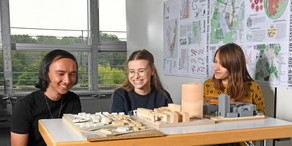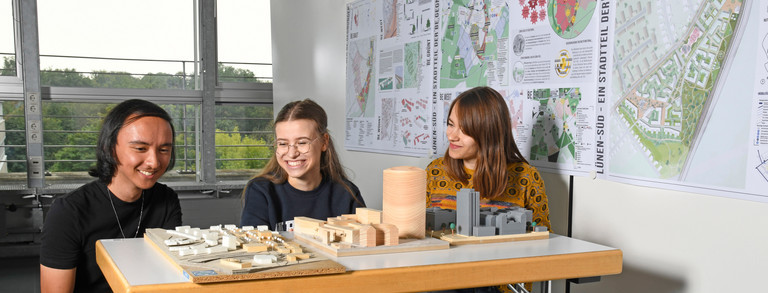Specializations
Within the Master in Spatial Planning students have the opportunity to choose a specialization. Within the specialization students can delve into central topics and challenges of urban and spatial planning and develop an individual profile within the framework of eight specializations offered. The choice of a specialization is possible (but not mandatory) according to individual decision. Students can choose from the topics below, a sub-topic, or a synthesis of topics.
Traditionally, legally defined plans are at the center of the work of spatial planners. The immediate connection to action in form of measures and projects is excluded, as is the implementation of the plan. In planning practice, however, a return to the necessity of a planned, integrative approach can be observed. The obvious disadvantages of project-oriented planning lead to a debate about a renaissance of strategic planning. Strategies organize thinking about issues, indicate priorities and say why. They provide reference points to which actors can orient themselves. Depending on their level of abstraction, strategies can manifest themselves in vision statements as well as in programs and plans, and in concrete projects and individual actions. In the specialization "Strategic Urban and Regional Development" concepts, objectives, institutional arrangements and procedures of strategic spatial development and management at the local, regional and large-scale level are dealt with in a theoryguided form and on the basis of current case studies. Here the complementary interaction of formal and informal collaborative approaches and procedures are of particular importance, especially with regard to acceptance requirements. The thematic focus is on current issues, such as demography, housing, climate change, land use, and economic development.
Cities and rural areas are in a constant state of change in view of current and future societal challenges. The responsible design and qualification of the built environment for a just, inclusive and stabilising development of urban, suburban and rural areas are the subject of the urban design specialization. Against the background of these challenges, theoretical and practical knowledge is taught in order to develop concepts and strategies and to consciously help to shape the underlying processes. Different scale levels, methods of urban planning analysis and design, instruments of quality assurance and participation in urban development are an integral part of this integrated urban planning approach.
As part of this focus, a range of different courses on the topics of open space, landscaping and environmental planning as well as Adaptation to Climate Change in Spatial Planning is offered. The focal point is on current topics (such as green-blue urban infrastructure, adaptation to climate change), and instrumental (effectiveness of planning instruments) as well as methodological aspects (modeling & simulation; design, planning and research methods).
This specialization focusses on mobility, transport and spatial development, and the interplay between these concepts. Spatial development and mobility are linked and current challenges often require an integral vision to ensure sustainable urbanization and sustainable transport in the future. Topics in this specialization include for example accessibility, encouraging sustainable travel, etc. The specialization focusses on theory, research in the field, as well as practical aspects. This specialization is possible in English and German.
Housing is one of the key functions of cities. The provision of housing is one of the major challenges of urban planning in many European countries. Housing scarcity affects not only affordable housing but also other submarkets. Aside from that, housing policy is challenged with a plethora of goals, some of which overlap or even clash. They span from affordability and inclusivity to resource management and climate neutrality. Over the past few years, land has become crucial to govern for social and public welfare-oriented urban development. Spatial planning creates land for housing. This is declared as a political goal and a central task of spatial planning. On the one hand, it entails the provision of land through land policy as well as the establishment of framework conditions for sustainable urban development through housing policy. Land and housing are both part of the same value chain, but their respective policy fields follow different logics. The specialization deals with the political and planning fields related to land and housing and, above all, with their complex and charged dependencies. The examination of land and housing does not stop at a purely institutional and instrumental view (these rather form the starting point and prerequisite of the courses). The seminars focus on social, economic, and urban design issues, as well as strategic aspects of land and housing policy. Housing" does not only consider the individual flat and the individual residential building but also includes the living environment ("neighbourhood") as well as urban and inter-regional land and housing market trends.
Gegenstand der Vertiefung ist das nachhaltige Management von Wohn- und Gewerbeimmobilien. Entsprechend des zentralen Lebenszyklusansatzes werden die Methoden und Instrumente zur Planung, Entscheidung und Kontrolle von Immobilien sowohl in der Entwicklungs- als auch in der Nutzungsphase vorgestellt und angewandt. Im Mittelpunkt steht dabei das vermögensorientierte Management bestehender Immobilien, indem – aufbauend auf den klassischen Elementen der Bestandsentwicklung – die Immobilie anhand der künftigen Zahlungsströme dynamisch, zukunfts- und risikoorientiert und nachhaltig über die Restnutzungsdauer bewertet und entwickelt wird. Dazu werden Immobilienfinanzierungsinstrumente, staatliche Förderungen und Abgaben in die Vermögensbewertung ebenso integriert wie Methoden zur Erfassung des Investitionsrisikos und des Reporting. Wertschöpfungspotentiale zur nachhaltigen Weiterentwicklung und Optimierung der Immobilie werden in Verbindung mit Softwarelösungen für das digitale Immobilienmanagement vorgestellt und angewandt. Die divergierenden Akteursperspektiven – von der Kommune über die privatwirtschaftlichen Projektentwickler hin zu den Asset und Portfolio Managern in der Nutzungsphase – werden zielgerichtet mit aktuellen (technologieorientierten) Forschungsergebnissen und Megatrends des Immobilienmanagements verknüpft.
Der Schwerpunkt greift die aktuellen Zielsetzungen für einen Umbau des deutschen Strom- und Wärmeversorgungssystems und der eingeleiteten Entwicklungsprozesse im Rahmen der Energiewende auf. Schwerpunkte sind hierbei zum einen die raumbezogenen Planungsprozesse auf kommunaler, regionaler und überregionaler Ebene zur Bedarfsermittlung sowie zur Auswahl und planerischen Ausweisung der erforderlichen Flächen, Standorte und Trassen. Zum anderen befasst sich der Schwerpunkt mit der akzeptanz- und transparenzsichernden Verfahrensgestaltung durch integrierte, koordinative Abstimmungsprozesse zwischen den unterschiedlichen Akteuren aus den Bereichen der Energiewirtschaft, der Energiefachplanung, der räumlichen Gesamtplanung und der zivilgesellschaftlichen Akteure. Zusätzlich bietet der Schwerpunkt über die Kooperation mit der Fakultät 08 die Möglichkeit vertieftes Fachwissen aus der Energietechnik (Elektrotechnik, Verfahrenstechnik) als Grundlage für diese Planungen zu erwerben. Die Kooperation mit dem Institut für Berg- und Energierecht an der Ruhr-Universität Bochum bietet die Gelegenheit zur Vertiefung energiewirtschaftlicher und energierechtlicher Fragestellungen und zum Erwerb des Zertifikats „Kompaktlehrprogramm Energiewirtschaft“.
All urban areas in European countries and beyond are facing huge spatial challenges. The drivers for urban transformation are manifold and include technological change and digitalization (smart cities), migration and demographic changes, climate change, increasing relevance of agglomeration economies, as well as post- and re-industrialization. The spatial impacts of these transformations are complex and in part contradictory. Growth in metrocities (or post-metropolis) goes hand in hand with functional and physical densification in de-centralized agglomerations. At the same time, we observe urban shrinkage, the growth of low-density suburbs and the rising relevance of what Sieverts called the Zwischenstadt (in-between city). The spatial implications of structural change and the organization of such transformation demand for deliberate strategies to plan, govern and revitalize urban areas, economically, socially and environmentally. In the scholarly literature, a wide range of new forms of interventions such as social innovation, collaborative governance, resilience, urban laboratories and urban strategy are discussed next to established approaches like learning regions or incremental planning.
